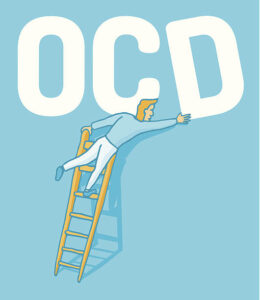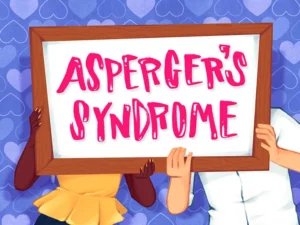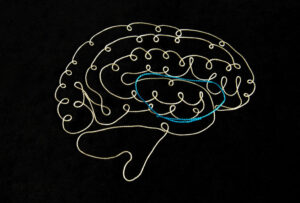Asperger’s Syndrome and OCD are two conditions that are often misunderstood. Many people don’t realize that they are related, or that they have similar symptoms. In this blog post, we will discuss the relationship between Asperger’s Syndrome and OCD, as well as some of the key similarities and differences between the two conditions. If you think that you or someone you know may be affected by either condition, it is important to know what to look for so that you can get the help you need.
Contents
What Is OCD?

OCD, also popular for its full name, Obsessive-Compulsive Disorder, is a mental disorder that is classified as an anxiety disorder. OCD is characterized by obsessive thoughts and repetitive behaviors. These obsessions can be anything from fear of contamination to worrying about making mistakes. The compulsions are the behaviors that people with OCD feel the need to do in order to ease their anxiety. These can include anything from washing their hands over and over again to checking that the stove is turned off multiple times. For people with OCD, these behaviors become so ingrained that they can interfere with everyday life. Some common obsessions and compulsions for people with OCD include:
- Fear of contamination or germs
- Excessive hand washing or cleaning
- Checking appliances and doors multiple times
- Counting, tapping or repeating words or phrases
- Arranging objects in a certain way
- Avoiding people or places that trigger anxiety
What Is Asperger’s Syndrome?

Asperger’s Syndrome is a developmental disorder that is similar to autism. People with Asperger’s Syndrome often have difficulty with social interaction and may display repetitive behaviors. They may also have a narrow range of interests. While the symptoms of Asperger’s Syndrome can vary from person to person, people with this condition typically have a higher than average IQ.
It is important to note that Asperger’s Syndrome is not the same as autism. Autism is a spectrum disorder, which means that there is a wide range of symptoms and severity. Asperger’s Syndrome is considered to be on the milder end of the autism spectrum.
Some of the most common signs and symptoms of Asperger’s Syndrome include:
- Difficulty with social interaction
- Repetitive behaviors
- Narrow range of interests
- Obsessive interests
- Sensitivity to light, sound and touch
- Delayed speech and language skills
- Clumsiness or poor coordination
Link Between The Two
Now that we know more about OCD and Asperger’s Syndrome, let’s take a look at how the two conditions are related.
Similarities

The main similarity between OCD and Asperger’s Syndrome is that both conditions are characterized by repetitive behaviors. People with OCD often have compulsions or things that they feel the need to do in order to ease their anxiety. People with Asperger’s Syndrome often have repetitive behaviors as well. These can be anything from lining up toys to obsessively talking about a specific topic.
Another similarity between the two conditions is that people with OCD and Asperger’s Syndrome often have difficulty with social interaction. This is because both conditions can cause people to fixate on certain things or avoid situations that trigger anxiety.
Differences
There are also some key differences between OCD and Asperger’s Syndrome. One of the main differences is that people with OCD typically have obsessions or things that they worry about excessively. People with Asperger’s Syndrome may fixate on certain topics or activities, but they don’t usually have the same level of anxiety or fear.
Another difference between the two conditions is that people with OCD often have a higher than average IQ. People with Asperger’s Syndrome also tend to have a higher than average IQ. However, people with OCD typically have normal intelligence.
So, what does all of this mean? Essentially, the main difference between OCD and Asperger’s Syndrome is that OCD is characterized by anxiety and fear while Asperger’s Syndrome is characterized by repetitive behaviors and difficulty with social interaction. However, the two conditions are similar in that they both involve repetitive behaviors and difficulty with social interaction.
Can One Disorder Lead To The Other?

When we talk about two overlapping disorders, the very prominent question in our minds is wether or not one can lead to the other. The simple answer is, we do not know for sure.
What we do know however, is that both conditions share certain risk factors. For example, both OCD and Asperger’s Syndrome are more common in males than females. Both conditions are also thought to be caused by a combination of genetic and environmental factors.
So, while we can’t say for sure that one disorder leads to the other, we do know that they share certain risk factors. This means that if you have one condition, you may be more likely to develop the other.
It is also worth noting that since both of these are very complex disorders, it is possible to have both OCD and Asperger’s Syndrome. This is known as co-occurring disorders or comorbidity.
If you think that you or someone you know may have OCD or Asperger’s Syndrome, it is important to talk to a mental health professional. They will be able to diagnose the condition and provide you with the resources and support you need. Both OCD and Asperger’s Syndrome are treatable conditions. With proper treatment, people with these disorders can lead happy and healthy lives.
Causes
Both OCD and Asperger’s are considered neurodevelopmental disorders. This means that they are caused by a combination of genetic and environmental factors.
For OCD, researchers believe that the condition is caused by a combination of genetic and environmental factors. Some studies suggest that OCD may be hereditary. However, more research is needed to confirm this. Some other risk factors for OCD can also include:
- Trauma
- Stressful life events
- Hormonal imbalance
- Certain infections
For Asperger’s Syndrome, the cause is also unknown. However, there is some evidence to suggest that it may be caused by a combination of genetic and environmental factors. Some studies have shown that Asperger’s Syndrome can run in families. However, more research is needed to determine the real causes. It is also a misconception that Asperger’s is caused due to bad parenting. This is a huge myth as the actual cause of Asperger’s is unknown.
Diagnosis

While OCD is defined and recognized as a separate diagnosis by DSM-5, popularly known as the Diagnostic and Statistical Manual of Mental Disorders, Asperger’s Syndrome is not. This is because in 2013, the American Psychiatric Association (APA) voted to merge Asperger’s Syndrome into the diagnosis of autism spectrum disorder (ASD).
So, while you cannot be diagnosed with Asperger’s Syndrome anymore, you may still hear people using this term.
OCD is diagnosed based on the presence of obsessions and/or compulsions that are time-consuming and cause distress or interfere with daily life. A diagnosis is typically made by a mental health professional such as a psychiatrist, psychologist, or clinical social worker.
ASD, on the other hand, is diagnosed based on the presence of social, communication, and behavioral symptoms. A diagnosis is typically made by a team of professionals that may include a psychiatrist, psychologist, speech therapist, and occupational therapist.
Diagnostic tools typically involve the use of questionnaires and/or clinical interviews. In some cases, a physical test or labaratory test may also be done to rule out other conditions.
Treatment
There is no cure for either OCD or Asperger’s Syndrome. However, there are treatments that can help to manage the symptoms of both conditions.
For OCD
OCD can be treated with both therapies and medication. Some of the most popular approaches include:
- Exposure therapy: This is a type of therapy that involves gradually exposing someone to the things that they fear. The goal of exposure therapy is to help people learn to manage their anxiety and fears.
- Cognitive-behavioral therapy: This is a type of therapy that helps people to change the way that they think and behave. CBT can be used to help people with OCD to manage their anxiety and fears.
- Medication: There are also several types of medication that can be used to treat OCD. Some of the most common medications include:
-Selective serotonin reuptake inhibitors (SSRIs)
-Serotonin and norepinephrine reuptake inhibitors (SNRIs)
-Tricyclic antidepressants (TCAs)
It is important to work with a mental health professional to find the right treatment for you.
For Asperger’s

As for Asperger’s Syndrome, there is no one-size-fits-all approach to treatment. However, some common treatments can include:
- Speech and language therapy: This can help to improve communication skills.
- Occupational therapy: This can help to teach people with Asperger’s Syndrome how to better manage everyday tasks.
- Cognitive-behavioral therapy: This can help to change negative thinking patterns and behavior.
- Social skills training: This can help to teach people with Asperger’s Syndrome how to interact with others.
- Medication: There are no FDA-approved medications for Asperger’s Syndrome. However, some medications can be used to treat associated symptoms, such as anxiety and depression.
In addition to professional treatments, leading a healthy lifestyle can also help to aid the treatment. This implies that one should have healthy eating habits, adequate and suitable sleep cycle, a fair amount of physical activity, minimal to no intake of substances like alcohol and tobacco, and stress management.
While both these conditions may not have a permanent cure, with professional support and self-care, one can manage the side effects and carry on to lead a fulfilling, healthy life despite the difficulties.
Conclusion
In conclusion of the above, both OCD and Asperger’s are mental disorders that can prove to be extremely debilitating. Both have their own set of symptoms that have some key similarities as well as some differences. These can have a significant impact on a person’s life if left untreated. If you think you may have OCD, Asperger’s, or any other mental disorder, please seek professional help. With the right diagnosis and treatment, you can live a happy and healthy life.
If you are searching for a reliable, affordable, and effective source for seeking help for OCD or similar issues, reach out to Therapy Mantra. We are a team of highly trained mental health professionals offering online therapy services. Contact us today to learn more about how we can help you or your loved ones. Visit our website to book an online therapy or you may also download our free OCD treatment app on Android or iOS for more information.


